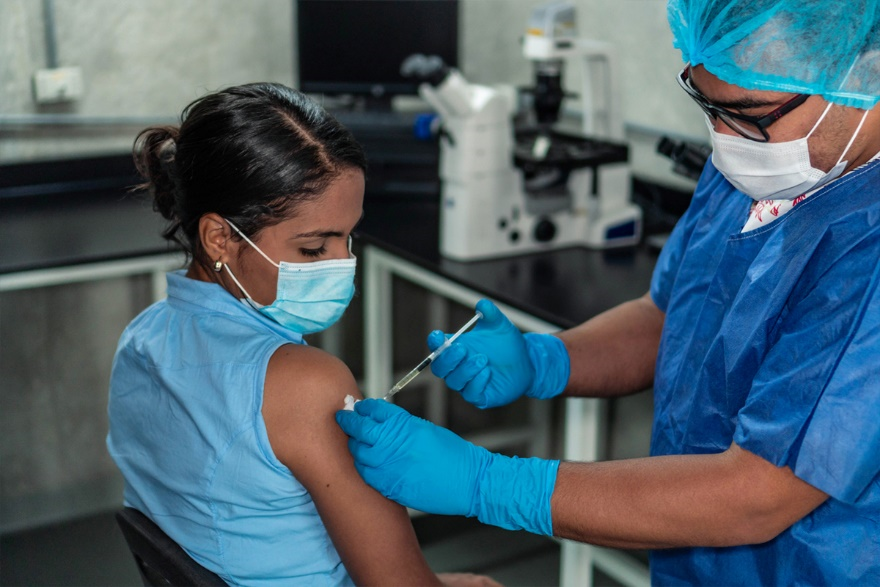![]() Print this Article | Send to Colleague
Print this Article | Send to Colleague
Updates on COVID-19 in the Workplace

The Supreme Court has stopped OSHA from implementing its COVID-19 Workplace requirement for employers with more than 100 employees to mandate vaccines or testing.
The Supreme Court did, however, affirm the legality of withholding Medicare and Medicaid payments from health care facilities that do not comply with federal vaccination mandates.
Painting with too broad a brush
When the Supreme Court heard arguments on January 6 from states and business groups challenging the federal mandates, Justice Amy Coney Barret expressed skepticism about the regulations because they apply equally to all 80 million employees across the country. She questioned whether a “more targeted” regulation might not be more appropriate. Different industries, different degrees of exposure to fellow workers or the public, different employee populations — there are so many variables. Justice Clarence Thomas, supporting that notion, pointed out that younger, unvaccinated workers may also have fewer health risks and not be likely to have the same vulnerabilities as older workers.
Unconstitutional?
Other justices, including Neil Gorsuch, Brett Kavanaugh and Chief Justice Roberts, questioned whether it is appropriate for an agency like OSHA to have “free rein” to wield such vast economic and political power without direct authorization from Congress. Roberts also asked why confronting COVID-19 isn’t “the primary responsibility of the states?”
The six conservative justices on the bench ruled that OSHA had exceed its authority in making the rule, and the three liberal justices dissented. With respect to upholding the requirement for health care facilities, Justices Roberts and Kavanaugh sided with the liberal justices in the 5-4 decision.
Presumption Laws
One of the arguments against such federal incursions into private and non-federal government employment practices centers on whether indeed COVID-19 is a workplace illness. There are many ways to spread and catch the virus outside of work. This a community illness. Catching the flu or getting a cold, even from a fellow employee, is not considered a workplace accident. Why should COVID-19 be? Why would workers compensation insurance apply?
Many state governments, however, have decided to mandate workers comp coverage for certain special groups because of what may be considered hazards that are similar to COVID-19. These states make the exception for certain workers who develop chronic illnesses, like cancer, resulting from repeated exposure to harmful materials and environments.
According to the National Council on Compensation Insurance, prior to COVID-19, at least 19 states had policies stating that when firefighters and other first responders develop lung and respiratory illnesses, those conditions are presumed to be work-related and covered under workers’ compensation. Unless a change has been specifically legislated it is unclear if those existing presumption policies would include COVID-19 illnesses.
But in many states, workers’ compensation coverage has been specifically extended to first responders and health care workers impacted by COVID-19. A common approach is to amend state policy so that COVID-19 infections in certain workers are presumed to be work-related and covered under workers’ compensation.
This presumption places the burden on the employer and insurer to prove that the infection was not work-related making it easier for those workers to file successful claims. Some employers and insurers have raised concerns that these presumption policies will increase insurance costs for employers at a time when businesses are already facing significant financial challenges.
In total, 17 states and Puerto Rico have taken action to extend workers compensation coverage to include COVID-19 as a work-related illness, according to the National Conference of State Legislatures (NCSL).
Nine states have enacted legislation creating a presumption of coverage for various types of workers. Minnesota, Utah and Wisconsin limit the coverage to first responders and health care workers. Illinois, New Jersey and Vermont cover all essential workers while California and Wyoming cover all workers. Four states have used executive branch authority to implement presumption policies for first responders and health care workers in response to COVID-19. Another four states, including California and Kentucky, have taken executive action to provide coverage to other essential workers like grocery store employees.
For a list of state actions to enact presumption laws see the NCSL website: https://tinyurl.com/5dvvxy4y
For more information or help, contact the Insurance professionals of EPIC’s PCOC Insurance Program.
Laura Coy Eric Shaw Michael Glauser
Program Leader National Sales Director Account Executive
laura.coy@epicbrokers.com eric.shaw@epicbrokers.com michael.glauser@epicbrokers.com

